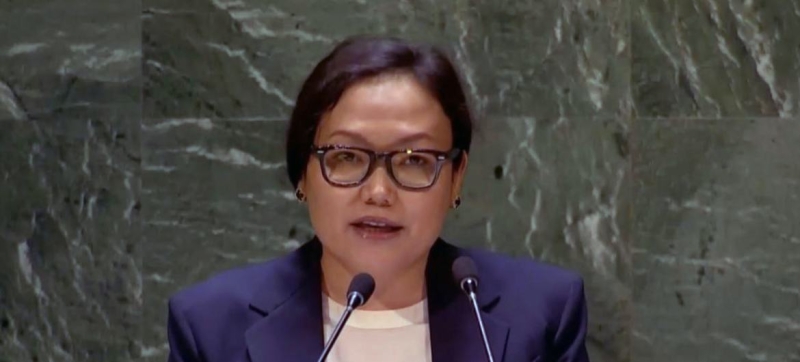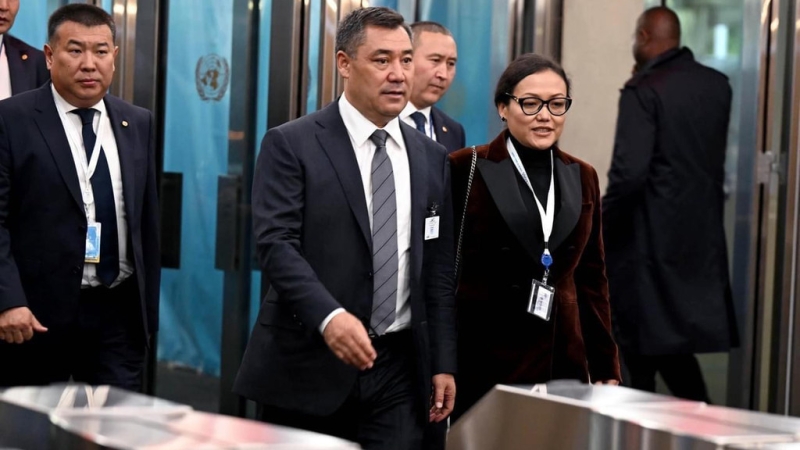
Permanent Representative of the Kyrgyz Republic to the UN Aida Kasymalieva. INTERVIEW| Permanent Representative of Kyrgyzstan to the UN: “Diplomacy, unfortunately, remains a men’s club” Women
On the International Day of Women in Diplomacy, which is celebrated on June 24, the UN News Service spoke with Ambassador Aida Kasymalieva, who represents Kyrgyzstan at the UN. During the interview, Aida spoke about gender stereotypes in diplomacy and how difficult it is to combine the role of a young mother with the official duties of an ambassador.
UN News Service: UN Women today released statistics regarding women diplomats at the UN. It says that only a quarter of the total number of ambassadors are women. You are not only a woman, but also a young woman. How do you live in such a “double minority”?
Aida Kasymalieva: You know, there are about 44 of us women now. It’s a one to four [ratio of female ambassadors to male ambassadors]. We have a very active Circle of Women Ambassadors. This is a circle of female ambassadors where we support each other. By the way, the resolution, which was adopted two years ago at the initiative of the Permanent Representative of the Maldives, on the establishment of the International Day of Women in Diplomacy, was supported by 191 votes or even 192 votes. The resolution was also initiated by this circle.
I’ve been here for two and a half years now, and I still have the impression that diplomacy, unfortunately, remains a men’s club. It may be easier for men to negotiate with each other. I think about this a lot – we need to train women. This is a wonderful day, but it is not to celebrate successes, but to highlight the role of women in peace processes, so that women are more likely to sit at the negotiating table.
UN News Service: You said that it may be easier for men to negotiate with each other. Why do you think so?
AK: For example, some resolution is being discussed, men pat each other on the shoulder, and sit down to talk over coffee. Then they are the first to sign up for the performance. They trust each other more. Why shouldn’t women do this too?
In the Eastern culture that we have in Kyrgyzstan, it is laid down that women should behave modestly. We can speak later. In fact, a woman must also overcome herself and stand in the first row. It is very important. Little things like that mean a lot, and that’s why you have to work on yourself.
UN News Service: I thought male ambassadors supported each other by leaning on for some geopolitical interests. Do you think that the male fraternity also plays a role?
AK:Geopolitics is the interests of the country. It’s always there. This is the basis. But there are other relationships between diplomats, and we notice this.
UN News Service: Well, now you have such brotherhood, or rather sisterhood, in one’s own circle… And yet, I will return to my original question. You are a woman and also very young. How do you work?
AK: You know, when I first arrived, people approached me at business meetings, we talked for a long time, and then the person at the end was very surprised that I was an ambassador because I looked young. And when I gave birth to a child here at my post, it caused a certain furore among the permanent representatives: the ambassador could still give birth? But everyone received it very warmly – both diplomats and permanent representatives. If a woman shows her knowledge and professionalism while working, then the issue of age fades into the background.

Aida Kasymalieva accompanies the President of Kyrgyzstan Sadyr Japarov at the UN headquarters.
UN News Service: I would like to avoid trivial questions, but I can’t help but ask how you manage to combine the role of a mother, a woman in the family and the role of a politician?
AK: The most popular question when I meet women or students, young people is how to combine career and family? The answer is obvious: firstly, it is the support of loved ones, the support of family, husband. Without support, of course, it is very difficult. We need to spread understanding in our society that women need to be supported in their careers and in education. This is good for both family and children. We need to work on it.
I did not use maternity leave at my post. I took a regular vacation, it’s only a month. When I went to work, I remember this morning, I was just in a completely broken state. How can you leave such a small child and go to work when it is so stressful? But I have made an internal decision that I can do this: combine both, come home between meetings, feed every three hours, then leave again for work. work. Children are always force majeure. You never know what will happen at night. You spend a sleepless night, and in the morning you have to go to an important meeting. smog. I was left alone with my child, but I had to go to a meeting online, at the government level. I’m talking, and she’s fidgeting under the table near her feet, whining something. Thank God, it was possible to turn off the sound at least for a while.
UN News Service: What would you like to advise girls who are thinking about to select the diplomat profession?
AK: This is a very interesting profession, it is a very important profession – given what is happening in the world now. Nowhere without women. These are not just some loud words that a woman always wants peace. When women are involved in negotiations, peace processes move better. Research shows this. Women have intuition. If they still have knowledge and languages, you won’t find anyone better than women in the negotiation process. Therefore, I want to tell girls who want to choose the profession of a diplomat that this is a very interesting job, but you need to work a lot on yourself.
